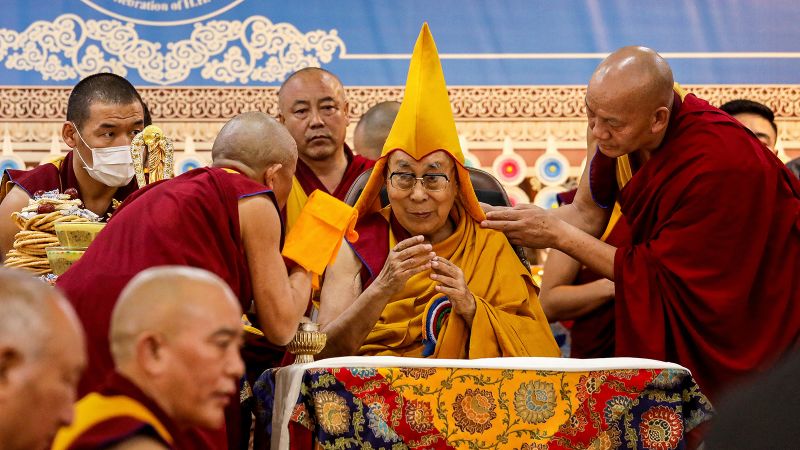The Dalai Lama has announced that he will have a successor after his death, ensuring the continuation of a centuries-old tradition that has become a central issue in the ongoing conflict with China over Tibet’s future. The spiritual leader of Tibetan Buddhism made this declaration on Wednesday through a video message addressed to religious elders gathering in Dharamsala, India, where he has resided since fleeing Tibet following a failed uprising against Chinese rule in 1959.
“I am affirming that the institution of the Dalai Lama will continue,” he stated in the pre-recorded message, emphasizing the numerous requests he has received from Tibetans and Tibetan Buddhists to maintain the tradition. “The Gaden Phodrang Trust has sole authority to recognize the future reincarnation; no one else has any such authority to interfere in this matter,” he added, referring to the formal office of the Dalai Lama. He underscored that the search and recognition of the future Dalai Lama should proceed “in accordance with past tradition.”
Historical Context and Current Implications
The announcement comes at a pivotal moment, just days before the Dalai Lama’s 90th birthday, setting the stage for a potential clash between Tibetan leaders in exile and China’s Communist Party. The latter asserts that it holds the exclusive right to approve the next Dalai Lama. This conflict over succession is not just a religious matter but a geopolitical one, reflecting broader tensions between Tibetan autonomy movements and Chinese sovereignty claims.
Historically, the Dalai Lama has been both a spiritual and political leader for Tibetans. The current Dalai Lama, Tenzin Gyatso, has been a symbol of Tibetan identity and resistance since he assumed the role in 1940. His escape to India in 1959 marked a significant moment in Tibetan history, as it led to the establishment of a Tibetan government-in-exile and a global movement advocating for Tibetan rights.
The Succession Dilemma
In a memoir published earlier this year, the Dalai Lama reiterated his stance that his successor would be born in the “free world” outside of China, urging his followers to reject any candidate selected by Beijing. This could potentially lead to the emergence of two rival Dalai Lamas: one chosen by the Tibetan spiritual community and another by the Chinese government.
The Dalai Lama has previously mentioned that around the age of 90, he would consult with high lamas and the Tibetan public to reassess the necessity of the Dalai Lama institution. His recent announcement, however, suggests a definitive plan to continue the lineage, despite the political complexities involved.
Expert Opinions and Future Prospects
Experts on Tibetan affairs suggest that the Dalai Lama’s decision is a strategic move to preempt Chinese interference. “By declaring the succession process now, the Dalai Lama is setting clear guidelines for his followers and the international community,” said Dr. Lobsang Sangay, a prominent Tibetan scholar and former head of the Tibetan government-in-exile.
“The Dalai Lama’s announcement is not just about religious continuity; it’s a statement of cultural and political defiance against Chinese attempts to control Tibetan Buddhism,” Sangay added.
Meanwhile, China has consistently maintained that it has the authority to appoint the next Dalai Lama, a position that aligns with its broader policy of integrating Tibet more closely with the rest of the country. This stance is part of China’s larger effort to control religious practices and institutions within its borders, which it views as potential sources of dissent.
Looking Ahead
The Dalai Lama’s announcement is likely to intensify the international spotlight on Tibet and its quest for autonomy. As the world watches, the process of selecting the next Dalai Lama could become a focal point for global discussions on religious freedom and human rights in China.
For Tibetans, the succession of the Dalai Lama is not just about spiritual leadership but also about preserving their cultural identity and aspirations for self-determination. As the current Dalai Lama approaches his 90th year, the decisions made in the coming months will have profound implications for the future of Tibetan Buddhism and the broader geopolitical landscape.
In conclusion, the Dalai Lama’s vow to ensure a successor underscores the enduring significance of his role and the institution he represents. As Tibetans and the international community prepare for the next chapter, the world will be watching closely to see how this historic transition unfolds.
